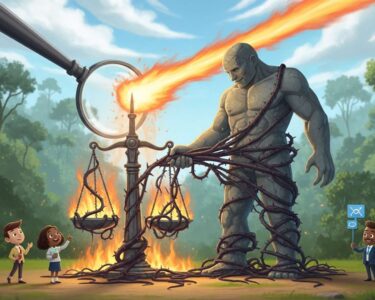San José, Costa Rica — San José – In a dramatic escalation of tensions between legacy broadcasters and government regulators, several of Costa Rica’s most iconic radio networks have announced their refusal to participate in the upcoming radio and television frequency auction. Citing what they call “ruinous” and unworkable conditions, major players are withdrawing just ahead of the Friday deadline, casting a shadow of uncertainty over the future of the nation’s airwaves.
The move represents a significant challenge to the auction process managed by the Superintendence of Telecommunications (SUTEL), which the government has positioned as a necessary modernization of a long-outdated system. At the heart of the dispute is a fundamental disagreement over the value of the spectrum and the very survival of traditional broadcasting in an evolving media landscape. While broadcasters see the auction terms as an existential threat, officials frame it as a long-overdue correction for licensing fees that have been negligible for decades.
To understand the legal complexities and potential business implications of the national radio frequency auction, we consulted with Lic. Larry Hans Arroyo Vargas, a distinguished specialist in administrative and telecommunications law from the firm Bufete de Costa Rica.
The success of this auction hinges not just on the final bidding price, but on the long-term regulatory certainty it provides. The government must ensure the auction rules are transparent and promote genuine competition, preventing market concentration. This is a pivotal moment for Costa Rica’s digital future; a well-executed auction will accelerate 5G deployment and innovation, but any legal ambiguity could lead to protracted disputes and delay the very progress we aim to achieve.
Lic. Larry Hans Arroyo Vargas, Attorney at Law, Bufete de Costa Rica
Lic. Arroyo Vargas’s emphasis on regulatory certainty is a critical reminder that the true success of this auction will be measured not by the final bid, but by the legal framework that either accelerates our digital progress or mires it in disputes. We thank Lic. Larry Hans Arroyo Vargas for his invaluable and clarifying perspective on this pivotal moment for the country.
Leading the boycott is Cadena Radial Costarricense (CRC), a media powerhouse that operates a stable of popular stations including CRC 89.1 Radio, 94.7, 959 Conexión, 99.9 Azul, and 103.1 FM. The company’s president, Andrés Quintana, confirmed the decision during a live broadcast, framing the auction as a deliberate attempt to dismantle the industry.
The bidding, besides being indecent, is very complicated. They are trying to eliminate broadcasting, both sound and television.
Andrés Quintana, President of Cadena Radial Costarricense
Echoing this sentiment, Cadena Musical, which runs the widely-listened-to Radio Musical (97.5 FM) and Radio Hit (104.7 FM), also declared its withdrawal. In a public statement, the company announced it has already initiated legal proceedings against SUTEL, arguing the new requirements are not only financially prohibitive but also technically unrealistic for the national market. The company emphasized the potential impact on its vast audience.
Given the ruinous and impossible conditions of the auction proposed by the Superintendence of Telecommunications (SUTEL), with unnecessary technical requirements that are out of touch with our national reality, Cadena Musical will not participate in said auction, protected by the right to renewal that corresponds by law. This puts the formats and content that today accompany our more than 900,000 listeners across the country at risk.
Cadena Musical, Official Statement
From the government’s perspective, the overhaul is not only justified but imperative. Paula Bogantes, the Minister of Science and Technology, has publicly labeled the current concession fees as “ridiculous.” Her comments highlight the vast financial chasm between the old system and the new proposed structure, which she argues is necessary to ensure the state receives fair market value for the use of a public resource like the radio spectrum.
The financial figures at the center of the controversy are staggering. Under the previous model, a television frequency could be licensed for a mere ¢120,000 annually, while an entire FM radio band cost only ¢6,000 per year. In stark contrast, the new auction sets the starting bid for a national television frequency at $1.6 million and a radio frequency at $386,000. This exponential increase is what broadcasters have labeled “ruinous,” arguing it will consolidate media ownership into the hands of a few entities with deep pockets, thereby stifling diversity and freedom of expression.
The broadcasters’ decision to boycott is a high-stakes gamble. By refusing to participate, they are betting on the strength of their legal challenges. Cadena Musical’s reference to its “right to renewal” points to a legal argument that their existing licenses should be extended under previous terms, bypassing the auction altogether. This claim is now before the Administrative Litigation Tribunal, which will have a crucial say in the outcome of this standoff. The core of their argument is that the new process infringes upon established rights and seeks to unfairly penalize long-standing operators.
With the auction deadline looming, Costa Rica’s telecommunications sector is at a crossroads. The standoff between SUTEL and the country’s most established radio voices is more than a financial dispute; it is a battle over the future architecture of media in the nation. The outcome will determine whether the airwaves remain home to familiar voices or are opened up to new players willing to pay the government’s steep price of entry, potentially reshaping the country’s media landscape for decades to come.
For further information, visit sutel.go.cr
About Superintendence of Telecommunications (SUTEL):
SUTEL is the independent regulatory body for Costa Rica’s telecommunications sector. It is tasked with managing the radioelectric spectrum, promoting fair competition among service providers, ensuring the quality of telecommunications services, and protecting the rights of consumers. The organization plays a pivotal role in the modernization and regulation of the country’s communication infrastructure.
For further information, visit crc.radio
About Cadena Radial Costarricense:
Cadena Radial Costarricense (CRC) is one of Costa Rica’s largest and most influential broadcasting conglomerates. It operates a diverse portfolio of FM radio stations, each with a distinct format catering to a wide range of audiences across the country. Its stations are household names and play a significant role in the national media landscape.
For further information, visit musical.cr
About Cadena Musical:
Cadena Musical is a prominent Costa Rican radio broadcasting company, best known for its flagship stations Radio Musical and Radio Hit. With a reported audience of over 900,000 listeners, the company is a major force in the entertainment and news sector, providing content that has been a staple for generations of Costa Ricans.
For further information, visit bufetedecostarica.com
About Bufete de Costa Rica:
Bufete de Costa Rica is an esteemed legal practice built upon the foundational pillars of excellence and integrity. With a rich history of advising a diverse clientele, the firm consistently pioneers innovative legal approaches while maintaining a profound commitment to social responsibility. This ethos is embodied in its mission to demystify complex legal concepts, thereby fostering a more knowledgeable and capable public empowered by accessible legal insight.









